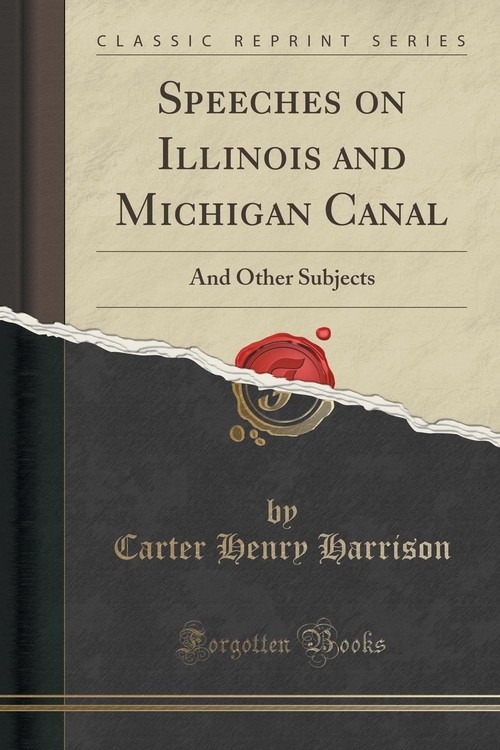Speeches on Illinois and Michigan Canal And Other Subjects (Classic Reprint)
Harrison Carter Henry
Speeches on Illinois and Michigan Canal
And Other Subjects (Classic Reprint)
Harrison Carter Henry
- Wydawnictwo: FB &c Ltd
- EAN: 9781331263579
- Ilość stron: 42
- Format: 15.2x22.9cm
- Oprawa: Miękka
Niedostępna
Opis: Speeches on Illinois and Michigan Canal - Harrison Carter Henry
Excerpt from Speeches on Illinois and Michigan Canal: And Other Subjects
In the northeastern corner of the State, on the southwestern bend of Lake Michigan, at that date was located Fort Dearborn, a small frontier post, guarded by a company of United States soldiers.
Sir, outside the fort were the cabins of a half dozen white men (intermarried with squaws), who eked out a scanty subsistence by doing odd jobs for the people in the fort, and by trading with the Indians who came at stated periods to receive blankets, the gift of the Great Father at Washington, and to trade furs with the resident agents of the American Fur Company for the red man's treasures - whisky and powder.
The fort and these cabins covered nearly all the dry land which lay within several miles. To the east was the great lake, three hundred miles long, sixty miles wide, and nine hundred feet deep. Its fountain waters were plowed once or twice a year only, by a small schooner, which supplied the fort and the fur agency. In all other directions, for hundreds of miles, stretched a wild prairie, low, flat, uninviting, and uninhabited, except by a few scattered tribes of Indians.
Along the lake shore, sir, was a narrow, sandy ridge, a sort of natural causeway, only a few feet higher than the lake. Excepting this ridge, nearly all the land for many miles was a reedy marsh or a low prairie, so flat as to hold the spring rains in its tangled grass as in a sponge. A person on horseback, leaving this ridge, found himself, during the spring months, up to the saddle-skirts in marsh, or floundering along the flat prairie, which at that period of the year was but little better than marsh. And even as late as July, a pedestrian could reach the Des Plaines River, ten miles west, only by wading over shoe-top in water, or by springing from ant-hill to ant-hill, the only dry land near.
Sir, the eye of a prophet alone could have seen here the site of one of the world's great cities.
Immediately under the stockades of the fort lazily lay a small creek, or rather bayou, reaching back from the lake shore a little over a half mile, where it was parted into two branches, one coming from the north, the other from the south, nearly parallel with the lake, and neither over five miles long. That creek lay sullen and black like a serpent sleeping in the marsh. Its average width did not exceed sixty feet, and at its mouth, where the sands were driven in by the lake storms, it could in late summer be crossed almost dry-shod. Its dark waters were rarely disturbed, except by the flappings of water fowls, whose nestings were in the bullrushes along its low margin, or by the silent natation of the muskrat, or by the almost equally silent dip of an occasional red man's paddle.
In more respects than in appearance did that inky bayou resemble a sleeping serpent. Sir, it only required the prickings of man's warming energy to quicken it into a life, which would send abroad a commerce far greater than that which floated on the Thames a half century before.
That creek was the Chicago River; to-day it is the harbor of a city of nearly a half million of people - clearing from its piers last year 10,284 vessels, of a tonnage of 3,311,083 tons. It is the feeder of the Illinois and Michigan Canal, the subject of my present remarks. That little creek, which now flows up hill, has been for ages the fast-and-loose link uniting two vast river systems flowing into far distant oceans. It is destined to exercise an influence upon the world's commerce vastly greater than did Rome's tawny Tiber or Egyptian Nilus.
Ages ago that link was fast united. Then it opened or closed as the waters were high or low. Now, since a few shovelfuls of earth have been judiciously removed, it is again permanently united, and Lake Michigan sends a part of her crystal drops to mingle with those of the Father of Waters. Some of us here present will live to see mighty s
Szczegóły: Speeches on Illinois and Michigan Canal - Harrison Carter Henry
Nazwa: Speeches on Illinois and Michigan Canal And Other Subjects (Classic Reprint)
Autor: Harrison Carter Henry
Wydawnictwo: FB &c Ltd
Kod paskowy: 9781331263579
Języki: angielski
Ilość stron: 42
Format: 15.2x22.9cm
Oprawa: Miękka

































